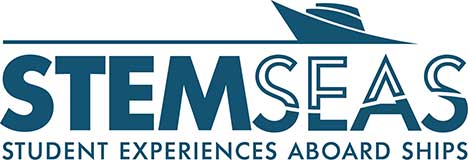On the R/V Thompson, Seattle to Honolulu
Community College Faculty Expedition
Leadership Team
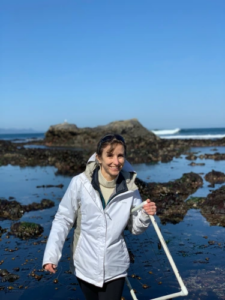 Marina Halverson knew from a young age that she wanted to study the ocean even though she grew up in landlocked Minnesota. She took as many aquatic science electives as possible (plankton biology, ichthyology, lake ecology) while working toward a B.S. in Biology from the University of Minnesota – Duluth. The following year she moved to Hawaii to pursue an M.S. in Biological Oceanography at the University of Hawaii. During her time at UH, she enjoyed researching marine microbes at the Hawaii Institute of Marine Biology but discovered a real passion for teaching during her time as a teaching assistant. Since 2013 she has been on the faculty at Seattle Central College teaching oceanography, marine biology, and general biology. Some favorite hobbies are tidepooling, beachcombing, and hiking on the Olympic Peninsula.
Marina Halverson knew from a young age that she wanted to study the ocean even though she grew up in landlocked Minnesota. She took as many aquatic science electives as possible (plankton biology, ichthyology, lake ecology) while working toward a B.S. in Biology from the University of Minnesota – Duluth. The following year she moved to Hawaii to pursue an M.S. in Biological Oceanography at the University of Hawaii. During her time at UH, she enjoyed researching marine microbes at the Hawaii Institute of Marine Biology but discovered a real passion for teaching during her time as a teaching assistant. Since 2013 she has been on the faculty at Seattle Central College teaching oceanography, marine biology, and general biology. Some favorite hobbies are tidepooling, beachcombing, and hiking on the Olympic Peninsula.
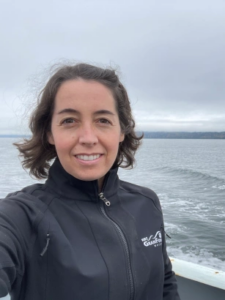 Dana Vukajlovich is a professor of geology and oceanography at Bellevue College, a community college in Washington state. She studied geochemistry at Caltech for her Bachelor’s degree and went on to Scripps Institution of Oceanography at UCSD for her Master’s degree in oceanography. She had the chance to go to sea as a college student and found a passion for oceanography and research at sea. After getting her master’s degree, she worked in multiple science outreach and informal education programs, including summer camps, science museums, a college-at-sea program, and non-profit environmental groups. Since 2015, she has been teaching oceanography and enjoying the chance to spark interest in the natural world in her students. She is excited to be involved in getting more community college students the opportunity to experience research at sea through STEMSEAS.
Dana Vukajlovich is a professor of geology and oceanography at Bellevue College, a community college in Washington state. She studied geochemistry at Caltech for her Bachelor’s degree and went on to Scripps Institution of Oceanography at UCSD for her Master’s degree in oceanography. She had the chance to go to sea as a college student and found a passion for oceanography and research at sea. After getting her master’s degree, she worked in multiple science outreach and informal education programs, including summer camps, science museums, a college-at-sea program, and non-profit environmental groups. Since 2015, she has been teaching oceanography and enjoying the chance to spark interest in the natural world in her students. She is excited to be involved in getting more community college students the opportunity to experience research at sea through STEMSEAS.
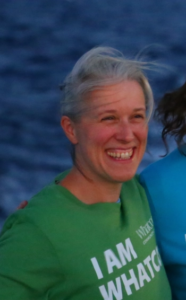 Kaatje van der Hoeven Kraft is a professor of geology and oceanography at Whatcom Community College in Bellingham, WA. She is a geoscience education researcher, particularly interested in factors that impact motivation and persistence with community college students in the geosciences. With this research, she applies educational and equity theory to practice. She has been teaching at the community college for over 20 years and this will be her third time out to sea with STEMSEAS.
Kaatje van der Hoeven Kraft is a professor of geology and oceanography at Whatcom Community College in Bellingham, WA. She is a geoscience education researcher, particularly interested in factors that impact motivation and persistence with community college students in the geosciences. With this research, she applies educational and equity theory to practice. She has been teaching at the community college for over 20 years and this will be her third time out to sea with STEMSEAS.
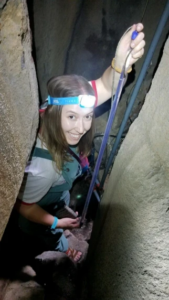 Nicole K. Murray is a Ph.D. candidate in the Department of Earth Science and Environmental Change at the University of Illinois – Urbana Champaign. Her research focuses on tropical Pacific climate and asks how we can use the stable isotopes of water to better understand ocean – atmosphere interactions. Nicole got involved with STEMSEAS as students collected surface seawater samples during their cruises in order to expand global availability of ocean salinity and isotope data. She has been sailing with STEMSEAS since 2019 and loves seeing students grow and bond with each other during their time at sea! Nicole bides her time between cruises by gardening, hiking and cooking.
Nicole K. Murray is a Ph.D. candidate in the Department of Earth Science and Environmental Change at the University of Illinois – Urbana Champaign. Her research focuses on tropical Pacific climate and asks how we can use the stable isotopes of water to better understand ocean – atmosphere interactions. Nicole got involved with STEMSEAS as students collected surface seawater samples during their cruises in order to expand global availability of ocean salinity and isotope data. She has been sailing with STEMSEAS since 2019 and loves seeing students grow and bond with each other during their time at sea! Nicole bides her time between cruises by gardening, hiking and cooking.
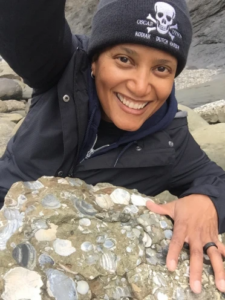 Dr. Sian Proctor is a Geoscience Professor at the Maricopa Community Colleges, an Afrofuturism Artist, and an Astronaut. She is the Chief Inspiration Astronaut of Space2inspire and founder of The Proctor Foundation for Art and Science. She was the mission pilot for SpaceX Inspiration4, the first all-civilian orbital mission. She is the first female commercial astronaut spaceship pilot and the only African American woman to ever be a mission pilot. She is also the first African-American commercial astronaut, and the first African-American to paint in space. She is currently serving as a member of the National Space Council Users’ Advisory Group. She is also one of The Explorer’s Club 50: Fifty People Changing the World the world should know about. Her motto is Space2inspire where she encourages people to use their unique strengths and passion to inspire themselves and those within their reach. She believes that we need to actively strive for a just, equitable, diverse, and inclusive (J.E.D.I.) space both on Earth and beyond.
Dr. Sian Proctor is a Geoscience Professor at the Maricopa Community Colleges, an Afrofuturism Artist, and an Astronaut. She is the Chief Inspiration Astronaut of Space2inspire and founder of The Proctor Foundation for Art and Science. She was the mission pilot for SpaceX Inspiration4, the first all-civilian orbital mission. She is the first female commercial astronaut spaceship pilot and the only African American woman to ever be a mission pilot. She is also the first African-American commercial astronaut, and the first African-American to paint in space. She is currently serving as a member of the National Space Council Users’ Advisory Group. She is also one of The Explorer’s Club 50: Fifty People Changing the World the world should know about. Her motto is Space2inspire where she encourages people to use their unique strengths and passion to inspire themselves and those within their reach. She believes that we need to actively strive for a just, equitable, diverse, and inclusive (J.E.D.I.) space both on Earth and beyond.
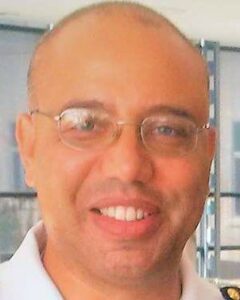 Rob Sparrock is the Office of Naval Research program manager for the six Navy owned Oceanographic Research Vessel and Deep-Sea Submersible ALVIN. He is a retired Navy Captain – Surface Warfare Officer having served on seven ship including Commanding Officer of USS Nicholas. He deployed overseas to Saudi Arabia, South Korea, Kosovo, Iraqi, and Afghanistan. He holds Master Degrees from Scripps Institution of Oceanography in Physical Oceanography and Navy Post Graduate School in Operations Analysis. He hold subspecialties in National Defense Strategy & Policy, Nuclear Power Propulsion; Science Technology & Acquisition Management.
Rob Sparrock is the Office of Naval Research program manager for the six Navy owned Oceanographic Research Vessel and Deep-Sea Submersible ALVIN. He is a retired Navy Captain – Surface Warfare Officer having served on seven ship including Commanding Officer of USS Nicholas. He deployed overseas to Saudi Arabia, South Korea, Kosovo, Iraqi, and Afghanistan. He holds Master Degrees from Scripps Institution of Oceanography in Physical Oceanography and Navy Post Graduate School in Operations Analysis. He hold subspecialties in National Defense Strategy & Policy, Nuclear Power Propulsion; Science Technology & Acquisition Management.
Faculty Participants
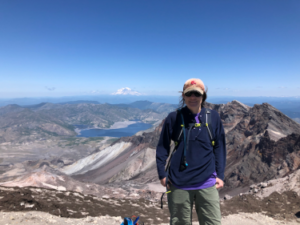 Hi! My name is Margee Will. I am a biologist in the Seattle area who took over teaching an oceanography course at a two-year college this past summer. As challenging as this teaching experience was, it reminded me how oceanography is an incredibly multidisciplinary and data rich field. I also really enjoyed working with the students and now teach a remote oceanography course for Centralia College. I am incredibly grateful for the opportunity to collaborate with scientists, educators, and crew on this expedition and look forward to future partnerships with the STEMSEAS team to promote at sea experiences for undergraduates.
Hi! My name is Margee Will. I am a biologist in the Seattle area who took over teaching an oceanography course at a two-year college this past summer. As challenging as this teaching experience was, it reminded me how oceanography is an incredibly multidisciplinary and data rich field. I also really enjoyed working with the students and now teach a remote oceanography course for Centralia College. I am incredibly grateful for the opportunity to collaborate with scientists, educators, and crew on this expedition and look forward to future partnerships with the STEMSEAS team to promote at sea experiences for undergraduates.
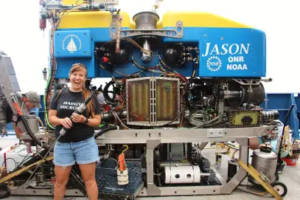 Dr. Tess Weathers is an Associate Professor in Engineering at Chabot College in Hayward, CA. While she currently teaches a wide variety of general engineering courses, her background is in Civil and Environmental Engineering and Hydrology. She is passionate about providing tools and opportunities for success for systemically underrepresented students in STEM while simultaneously encouraging and promoting environmental literacy and climate action. Her research interests reside at the intersection of water, biology, and chemistry, and include the effects of contaminants on subsurface microbial communities, 3-D modeling of thermal and hydrologic flows in the marine subsurface, and water supply and quality improvements using managed aquifer recharge. Tess has performed field work in Yellowstone National Park, human-centered design studies for water quality solutions in Huamancaca-Chico, Peru, and geophysical sampling at aboard R/V Atlantis. Tess also works as an engineer and hydrologist for Balance Hydrologics where she has collaborated on stormwater management and low-impact design projects and water quality sampling expeditions. When she is not in the office or the classroom, Tess enjoys snowboarding, surfing, hiking, and watching the San Francisco Giants with her dog Buster.
Dr. Tess Weathers is an Associate Professor in Engineering at Chabot College in Hayward, CA. While she currently teaches a wide variety of general engineering courses, her background is in Civil and Environmental Engineering and Hydrology. She is passionate about providing tools and opportunities for success for systemically underrepresented students in STEM while simultaneously encouraging and promoting environmental literacy and climate action. Her research interests reside at the intersection of water, biology, and chemistry, and include the effects of contaminants on subsurface microbial communities, 3-D modeling of thermal and hydrologic flows in the marine subsurface, and water supply and quality improvements using managed aquifer recharge. Tess has performed field work in Yellowstone National Park, human-centered design studies for water quality solutions in Huamancaca-Chico, Peru, and geophysical sampling at aboard R/V Atlantis. Tess also works as an engineer and hydrologist for Balance Hydrologics where she has collaborated on stormwater management and low-impact design projects and water quality sampling expeditions. When she is not in the office or the classroom, Tess enjoys snowboarding, surfing, hiking, and watching the San Francisco Giants with her dog Buster.
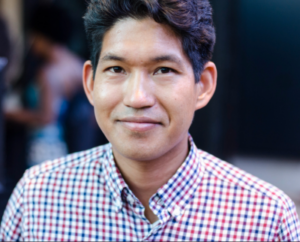 Roman P. de Jesus is a professor of oceanography and Earth science at Fullerton College. After learning to surf and completing his B.S. at UC San Diego, Dr. Roman moved ‘down the hill’ from UCSD to the Scripps Institution of Oceanography. In 2008, complete his PhD. research on the cycling of compound specific marine DOC and organic geochemistry. Before joining Fullerton College in 2015, Dr. Roman held teaching positions at Harvey Mudd College followed by the School of Marine and Atmospheric Sciences (SoMAS) at Stony Brook University. Dr. Roman is interested in enhancing diversity and equity in the geosciences while integrating culturally responsive pedagogy into his field courses. In addition, he actively contributes to equity and sustainability initiatives at Fullerton College. When he’s not teaching Dr. Roman still enjoys the occasional surf session but spends more time cycling.
Roman P. de Jesus is a professor of oceanography and Earth science at Fullerton College. After learning to surf and completing his B.S. at UC San Diego, Dr. Roman moved ‘down the hill’ from UCSD to the Scripps Institution of Oceanography. In 2008, complete his PhD. research on the cycling of compound specific marine DOC and organic geochemistry. Before joining Fullerton College in 2015, Dr. Roman held teaching positions at Harvey Mudd College followed by the School of Marine and Atmospheric Sciences (SoMAS) at Stony Brook University. Dr. Roman is interested in enhancing diversity and equity in the geosciences while integrating culturally responsive pedagogy into his field courses. In addition, he actively contributes to equity and sustainability initiatives at Fullerton College. When he’s not teaching Dr. Roman still enjoys the occasional surf session but spends more time cycling.
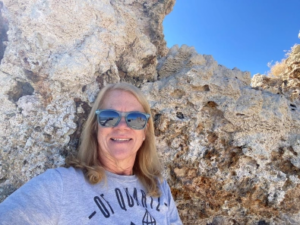 Karen Menge is an Associate Professor in the school of STEM at Delgado Community College in New Orleans, Louisiana. She is a native New Orleanian and began her career as a Geophysicist in the oil industry before transitioning to a teaching career. In her role as an educator, Karen is involved in various projects, including one with the City of New Orleans, where she is studying subsidence in Lafitte Greenway, a historic green space in central New Orleans. In addition to her research, Karen teaches a range of courses, covering subjects such as Physical Geology, Natural Disasters, Environmental Science, Physical Science and Physics.
Karen Menge is an Associate Professor in the school of STEM at Delgado Community College in New Orleans, Louisiana. She is a native New Orleanian and began her career as a Geophysicist in the oil industry before transitioning to a teaching career. In her role as an educator, Karen is involved in various projects, including one with the City of New Orleans, where she is studying subsidence in Lafitte Greenway, a historic green space in central New Orleans. In addition to her research, Karen teaches a range of courses, covering subjects such as Physical Geology, Natural Disasters, Environmental Science, Physical Science and Physics.
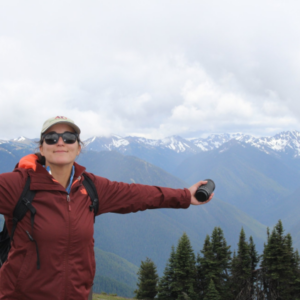 Dr. Cristina Cardona is an Associate Professor at the Community College of Baltimore County, Essex. She teaches Environmental Science, Oceanography, Earth Science and other Physical Science courses. She earned a B.S. and M.S. in Environmental Science from Dickinson College and American University. Her Ed.D. dissertation focused on non-science majors in community college online physical science courses. In addition, her graduate research focused on remediation of arsenic, PAHs, and mercury.
Dr. Cristina Cardona is an Associate Professor at the Community College of Baltimore County, Essex. She teaches Environmental Science, Oceanography, Earth Science and other Physical Science courses. She earned a B.S. and M.S. in Environmental Science from Dickinson College and American University. Her Ed.D. dissertation focused on non-science majors in community college online physical science courses. In addition, her graduate research focused on remediation of arsenic, PAHs, and mercury.
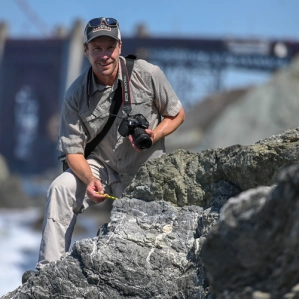 Callan Bentley is associate professor of geology at Piedmont Virginia Community College in Charlottesville, Virginia. He is a structural geologist with particular interest in the evolution of the Appalachian mountain belt. Other areas of interest include paleontology, meteoritics, and climate science, as well as the regional geology of the northern Rocky Mountains and the Franciscan mélange. Callan holds degrees in Geology (BS, William & Mary, and MS, University of Maryland) and Science Education (MS, Montana State University). He writes the geology blog Mountain Beltway, hosted by the American Geophysical Union. He is co-author of Historical Geology, a free online text”book” for college historical geology courses. He is a Fellow of the Geological Society of America, and a Past President of the Geological Society of Washington. He served for a decade as contributing editor to EARTH magazine. In 2024 and 2025, Callan is the President of the Virginia Geological Field Conference. The National Association of Geoscience Teachers recognized him with the James Shea Award. He has also won the Outstanding Faculty Award from the State Council on Higher Education in Virginia, and the Biggs Award for Excellence in Geoscience Teaching from the Geoscience Education Division of the Geological Society of America. Outside of work, Callan is really into birding, travel, roots music, and visual arts. He likes few things better than a good crossword puzzle.
Callan Bentley is associate professor of geology at Piedmont Virginia Community College in Charlottesville, Virginia. He is a structural geologist with particular interest in the evolution of the Appalachian mountain belt. Other areas of interest include paleontology, meteoritics, and climate science, as well as the regional geology of the northern Rocky Mountains and the Franciscan mélange. Callan holds degrees in Geology (BS, William & Mary, and MS, University of Maryland) and Science Education (MS, Montana State University). He writes the geology blog Mountain Beltway, hosted by the American Geophysical Union. He is co-author of Historical Geology, a free online text”book” for college historical geology courses. He is a Fellow of the Geological Society of America, and a Past President of the Geological Society of Washington. He served for a decade as contributing editor to EARTH magazine. In 2024 and 2025, Callan is the President of the Virginia Geological Field Conference. The National Association of Geoscience Teachers recognized him with the James Shea Award. He has also won the Outstanding Faculty Award from the State Council on Higher Education in Virginia, and the Biggs Award for Excellence in Geoscience Teaching from the Geoscience Education Division of the Geological Society of America. Outside of work, Callan is really into birding, travel, roots music, and visual arts. He likes few things better than a good crossword puzzle.
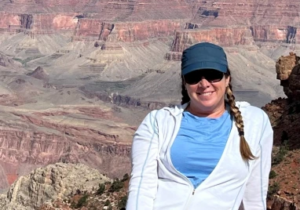 Merry Wilson is a Professor of Geology and Sustainability and Department Chair of Physical Sciences at Scottsdale Community College, Arizona. As a life-long shenanigans enthusiast, Merry strives to share her love and passion for the sciences to foster a positive STEM experience for all students and demystify the pathway to becoming a scientist. Bringing geology to the classroom, and more importantly students outside the classroom, Merry focuses on transitioning students from laboratory spaces to authentic field environments. This desert dweller is heading to sea for the first time with STEMSEAS and is excited to share her experiences with SCC students and faculty upon return.
Merry Wilson is a Professor of Geology and Sustainability and Department Chair of Physical Sciences at Scottsdale Community College, Arizona. As a life-long shenanigans enthusiast, Merry strives to share her love and passion for the sciences to foster a positive STEM experience for all students and demystify the pathway to becoming a scientist. Bringing geology to the classroom, and more importantly students outside the classroom, Merry focuses on transitioning students from laboratory spaces to authentic field environments. This desert dweller is heading to sea for the first time with STEMSEAS and is excited to share her experiences with SCC students and faculty upon return.
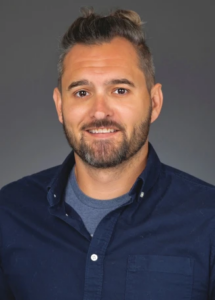 James Hobbs is an Assistant Professor of Geology at Tarrant County College and serves as the Physical Science Department Chair. With a foundation in geophysics, James’ previous research focused on the integration of multiple geophysical methods to enhance mapping of subsurface geometries in underexplored basins. He has taught a variety of earth and environmental courses, and currently teaches Oceanography, Environmental Science, and the Foundations of Environmental Protection and Sustainability. He is actively involved in numerous campus initiatives aimed at promoting inclusivity and broadening participation in STEM. James is also deepening his academic pursuits as a Ph.D. Candidate in the Educational Leadership and Policy Studies program at UTA. His research shines a light on faculty strategies in (re)designing and delivering geoscience curricula that move away from traditional eurocentric perspectives. Instead, he emphasizes the importance of incorporating diverse voices, especially those from historically underrepresented communities. In tandem with his research, James collaborates with UTA’s STEM Research Collaboratorium as a Geoscience Educational Researcher. Outside the realm of academia, he is a self-proclaimed ‘rock star’ turned ‘rock star,’ and you can find him either rocking out on stage with his band, Mirror Mirror or hosting the world’s raddest and baddest geology podcast, Geology on the Rocks!
James Hobbs is an Assistant Professor of Geology at Tarrant County College and serves as the Physical Science Department Chair. With a foundation in geophysics, James’ previous research focused on the integration of multiple geophysical methods to enhance mapping of subsurface geometries in underexplored basins. He has taught a variety of earth and environmental courses, and currently teaches Oceanography, Environmental Science, and the Foundations of Environmental Protection and Sustainability. He is actively involved in numerous campus initiatives aimed at promoting inclusivity and broadening participation in STEM. James is also deepening his academic pursuits as a Ph.D. Candidate in the Educational Leadership and Policy Studies program at UTA. His research shines a light on faculty strategies in (re)designing and delivering geoscience curricula that move away from traditional eurocentric perspectives. Instead, he emphasizes the importance of incorporating diverse voices, especially those from historically underrepresented communities. In tandem with his research, James collaborates with UTA’s STEM Research Collaboratorium as a Geoscience Educational Researcher. Outside the realm of academia, he is a self-proclaimed ‘rock star’ turned ‘rock star,’ and you can find him either rocking out on stage with his band, Mirror Mirror or hosting the world’s raddest and baddest geology podcast, Geology on the Rocks!
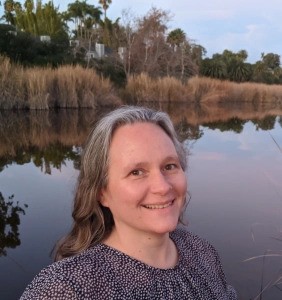 Waverly Ray is a professor of geography at San Diego Mesa College. She studied geology and geography as an undergraduate student at Virginia Tech and earned master’s and doctorate degrees in geography from Texas State University-San Marcos. Her graduate research with the Center for Global Geography Education investigated changes to undergraduate students’ international perspectives through online binational learning collaborations. Waverly’s professional interests include social and environmental justice, humanistic geography, mentorship, and community-based learning. As the faculty advisor to the student environmental sustainability and conservation club called TerraMesa, she oversees the campus vegetable garden and supports climate and food justice projects. As coordinator of the Transnational Approaches to Sustainable Food Futures and Strengthening Our Roots programs, she advises students on agriculture and food systems-related research and careers. With funding from the Academic Senate of California Community College’s Open Educational Resources Initiative, she co-authored a physical geography lab manual and a world regional geography textbook. She participated in the SAGE 2YC Change Agent program, was a member of the URGE 2YC pod, and attended SERC’s 2022 IGUaNA workshop. In 2015, she received the Associated Student Government professor appreciation award for excellence in teaching. She currently serves as an advisory board member representing California community colleges for the California Global Education Project. Since 2017, she has coordinated the My California GIS Mapping Showcase and Competition for the California Geographic Alliance.
Waverly Ray is a professor of geography at San Diego Mesa College. She studied geology and geography as an undergraduate student at Virginia Tech and earned master’s and doctorate degrees in geography from Texas State University-San Marcos. Her graduate research with the Center for Global Geography Education investigated changes to undergraduate students’ international perspectives through online binational learning collaborations. Waverly’s professional interests include social and environmental justice, humanistic geography, mentorship, and community-based learning. As the faculty advisor to the student environmental sustainability and conservation club called TerraMesa, she oversees the campus vegetable garden and supports climate and food justice projects. As coordinator of the Transnational Approaches to Sustainable Food Futures and Strengthening Our Roots programs, she advises students on agriculture and food systems-related research and careers. With funding from the Academic Senate of California Community College’s Open Educational Resources Initiative, she co-authored a physical geography lab manual and a world regional geography textbook. She participated in the SAGE 2YC Change Agent program, was a member of the URGE 2YC pod, and attended SERC’s 2022 IGUaNA workshop. In 2015, she received the Associated Student Government professor appreciation award for excellence in teaching. She currently serves as an advisory board member representing California community colleges for the California Global Education Project. Since 2017, she has coordinated the My California GIS Mapping Showcase and Competition for the California Geographic Alliance.
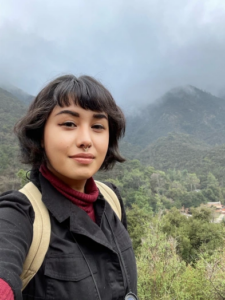 Michelle Barboza-Ramirez (they/them) is a queer latinx naturalist and geoscience professor living in Seattle. Their paleontological research has focused on extinct land dwelling, plant eating Miocene animals, while their current projects address diversity in STEM and outdoor equity. Along with working in higher ed, Michelle is a cohost for PBS Eons and cofounder of the Cosplay for Science Initiative. Michelle’s past projects include working in the education departments of the National Park Service and Natural History Museum of Los Angeles, as well as the paleontology departments of the Florida Museum of Natural History and John D. Cooper Center in Orange County, CA.
Michelle Barboza-Ramirez (they/them) is a queer latinx naturalist and geoscience professor living in Seattle. Their paleontological research has focused on extinct land dwelling, plant eating Miocene animals, while their current projects address diversity in STEM and outdoor equity. Along with working in higher ed, Michelle is a cohost for PBS Eons and cofounder of the Cosplay for Science Initiative. Michelle’s past projects include working in the education departments of the National Park Service and Natural History Museum of Los Angeles, as well as the paleontology departments of the Florida Museum of Natural History and John D. Cooper Center in Orange County, CA.
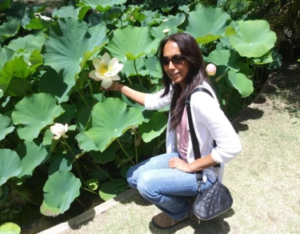 Kusali Gamage is an adjunct Professor at Austin Community College. She draws on her experience as a scientific ocean drilling researcher and geoscience education researcher to explore novel learning and teaching techniques in undergraduate studies. Gamage launched an undergraduate research program at the community college to provide first and second year STEM majors to experience geoscience research at an early stage in their academic career. In 2021, she received the Outstanding Adjunct Faculty Award from the National Association of Geoscience Teachers. She currently serves on the NSF’s Geoscience Directorate’s advisory board. Prior to joining the community college, Gamage worked as an expedition project manager for the International Ocean Discovery Program (IODP).
Kusali Gamage is an adjunct Professor at Austin Community College. She draws on her experience as a scientific ocean drilling researcher and geoscience education researcher to explore novel learning and teaching techniques in undergraduate studies. Gamage launched an undergraduate research program at the community college to provide first and second year STEM majors to experience geoscience research at an early stage in their academic career. In 2021, she received the Outstanding Adjunct Faculty Award from the National Association of Geoscience Teachers. She currently serves on the NSF’s Geoscience Directorate’s advisory board. Prior to joining the community college, Gamage worked as an expedition project manager for the International Ocean Discovery Program (IODP).
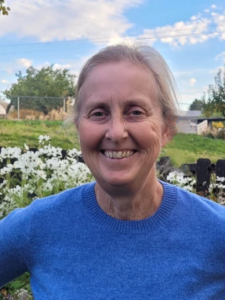 I am Rebecca Sperry. I teach General Biology and Cell Biology at Salt Lake Community college. I have been teaching for 13 years. I love working at a community college because I get to work with such a wide array of students from many diverse backgrounds, many of whom are working to fundamentally change their lives. Some are prepared, some are not. Many are working and have family responsibilities in addition to their student responsibilities. I am inspired by their ability to navigate their complicated lives and by their desire to gain an education to change the future for themselves and their families. I enjoy the challenge of designing my classes so both underprepared and well prepared students find success in reaching their diverse goals. I have an eclectic background, with undergrad degrees in chemistry and zoology, an MS in ethnobotany and PhD in developmental Biology. I also have some research experience in pharmacology and horticulture. I grew up on a farm in small town, western NY and enjoy riding horses, gardening and doing anything outside. My parents were immigrants from Norway, and I developed my love for the ocean while visiting relatives. I am so excited to get a spend a week on the open ocean and I am looking forward to learning to do marine Biological research, which is something I have not studied before. Can’t wait to meet you all and share teaching and learning experiences together.
I am Rebecca Sperry. I teach General Biology and Cell Biology at Salt Lake Community college. I have been teaching for 13 years. I love working at a community college because I get to work with such a wide array of students from many diverse backgrounds, many of whom are working to fundamentally change their lives. Some are prepared, some are not. Many are working and have family responsibilities in addition to their student responsibilities. I am inspired by their ability to navigate their complicated lives and by their desire to gain an education to change the future for themselves and their families. I enjoy the challenge of designing my classes so both underprepared and well prepared students find success in reaching their diverse goals. I have an eclectic background, with undergrad degrees in chemistry and zoology, an MS in ethnobotany and PhD in developmental Biology. I also have some research experience in pharmacology and horticulture. I grew up on a farm in small town, western NY and enjoy riding horses, gardening and doing anything outside. My parents were immigrants from Norway, and I developed my love for the ocean while visiting relatives. I am so excited to get a spend a week on the open ocean and I am looking forward to learning to do marine Biological research, which is something I have not studied before. Can’t wait to meet you all and share teaching and learning experiences together.
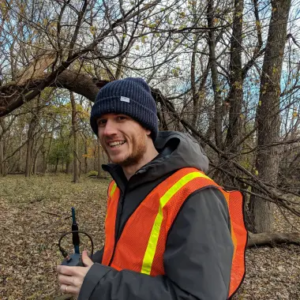 Hello! I’m Dr. Sheldon Turner. As the chairperson of the science department and a professor of geology and environmental science at Triton College, a community college just outside Chicago, I’m so excited for the opportunity to learn how to be a STEMSEAS mentor and bring community college students on future STEMSEAS expeditions. My academic background is in geoscience education research, specializing in decision-making and visualizations related to water resources. I’m used to taking students to rivers or helping them think about groundwater, so I am excited to learn how to apply these skills to ocean science. My most fulfilling work includes running and supporting National Science Foundation-funded scholarship programs for low-income STEM students. With my science department, I recently led the design and construction of a dedicated modular research laboratory for community college students to participate in authentic research experiences in their first years of college to build a sense of belonging in STEM fields. I’m most excited by this opportunity to see how STEMSEAS student experiences and research can be shared with other students and even inspire research projects back on the Triton campus!
Hello! I’m Dr. Sheldon Turner. As the chairperson of the science department and a professor of geology and environmental science at Triton College, a community college just outside Chicago, I’m so excited for the opportunity to learn how to be a STEMSEAS mentor and bring community college students on future STEMSEAS expeditions. My academic background is in geoscience education research, specializing in decision-making and visualizations related to water resources. I’m used to taking students to rivers or helping them think about groundwater, so I am excited to learn how to apply these skills to ocean science. My most fulfilling work includes running and supporting National Science Foundation-funded scholarship programs for low-income STEM students. With my science department, I recently led the design and construction of a dedicated modular research laboratory for community college students to participate in authentic research experiences in their first years of college to build a sense of belonging in STEM fields. I’m most excited by this opportunity to see how STEMSEAS student experiences and research can be shared with other students and even inspire research projects back on the Triton campus!
